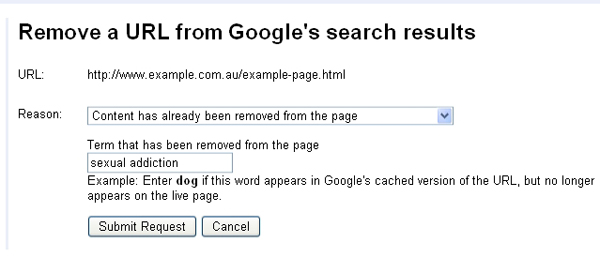Why You Need to Remove Sensitive Information from Google
Having sensitive or unwanted information appear in Google search results can have serious consequences for individuals and organizations alike. This can include personal data, financial information, or professional details that are not intended for public consumption. When such information is indexed by Google, it can be accessed by anyone with an internet connection, potentially leading to identity theft, financial loss, or reputational damage.
In today’s digital age, online presence is a crucial aspect of personal and professional life. A simple Google search can reveal a wealth of information about an individual or organization, including their contact details, work history, and personal interests. While this can be beneficial for networking and business purposes, it also raises concerns about privacy and security.
Removing unwanted information from Google search results is essential to maintaining online privacy and security. This can be achieved by using various methods, including Google’s URL removal tool, contacting website owners, and employing online reputation management strategies. By taking proactive steps to remove sensitive information from Google, individuals and organizations can protect their online presence and prevent potential harm.
Moreover, removing unwanted information from Google search results can also help to improve online reputation. When sensitive or negative information is removed, it can help to boost search engine rankings and improve the overall online presence of an individual or organization. This, in turn, can lead to increased business opportunities, improved networking, and enhanced personal and professional relationships.
In some cases, removing unwanted information from Google search results may require seeking professional help. Online reputation management services can provide expert guidance and support to help individuals and organizations remove sensitive information and improve their online presence. By working with professionals, it is possible to remove unwanted information from Google search results and maintain a positive online reputation.
Understanding How Google Search Works
Google’s algorithm is a complex system that indexes and ranks web pages to provide relevant search results to users. The algorithm takes into account various factors, including the content and structure of web pages, user behavior, and link equity. Understanding how Google’s algorithm works is essential to removing unwanted search results and improving online presence.
When a user submits a search query, Google’s algorithm quickly scans its vast index of web pages to retrieve relevant results. The algorithm uses a combination of natural language processing and machine learning to understand the context and intent behind the search query. It then ranks the retrieved web pages based on their relevance, authority, and user experience.
Google’s algorithm is constantly evolving, with new updates and improvements being rolled out regularly. One of the key factors that affects the visibility of search results is the concept of “crawlability.” This refers to the ability of Google’s crawlers to access and index web pages. If a web page is not crawlable, it may not appear in search results, even if it contains relevant content.
Another important factor is the concept of “link equity.” This refers to the value that Google assigns to a web page based on the number and quality of links pointing to it. Web pages with high link equity are more likely to appear in search results, as they are seen as authoritative and trustworthy.
Understanding how Google’s algorithm works can help individuals and organizations remove unwanted search results and improve their online presence. By optimizing web pages for crawlability and link equity, it is possible to increase the visibility of desired search results and reduce the visibility of unwanted ones.
Additionally, Google provides various tools and resources to help individuals and organizations manage their online presence. For example, Google Search Console allows users to monitor their website’s search engine rankings, crawl errors, and link equity. By using these tools, it is possible to identify and address issues that may be affecting the visibility of search results.
How to Remove Outdated or Irrelevant Content from Google
Removing outdated or irrelevant content from Google search results can be a challenging task, but it is essential to maintaining a positive online presence. There are several steps that can be taken to remove unwanted content from Google, including using Google’s URL removal tool and contacting website owners.
Google’s URL removal tool is a useful resource for removing outdated or irrelevant content from search results. The tool allows users to request the removal of specific URLs from Google’s index, which can help to improve the visibility of desired search results. To use the tool, users must first verify their website ownership through Google Search Console, and then submit a removal request for the specific URL.
Another effective way to remove outdated or irrelevant content from Google is to contact the website owner directly. If the content is hosted on a third-party website, it may be possible to request that the website owner remove the content or update it to reflect more accurate information. This can be a time-consuming process, but it can be effective in removing unwanted content from search results.
In some cases, it may be necessary to use a combination of both methods to remove outdated or irrelevant content from Google. For example, if the content is hosted on a third-party website, it may be necessary to contact the website owner to request removal, and then use Google’s URL removal tool to request the removal of the specific URL from Google’s index.
It is also important to note that removing outdated or irrelevant content from Google is not a one-time task. It is an ongoing process that requires regular monitoring and maintenance to ensure that unwanted content does not reappear in search results. By regularly checking search results and taking steps to remove unwanted content, individuals and organizations can maintain a positive online presence and improve their search engine rankings.
Additionally, it is essential to be proactive in removing outdated or irrelevant content from Google. This can be achieved by regularly reviewing and updating online content, and by using tools such as Google Search Console to monitor search engine rankings and identify potential issues.
The Role of Online Reputation Management in Removing Unwanted Search Results
Online reputation management plays a crucial role in removing unwanted search results from Google. It involves monitoring search results, addressing negative content, and maintaining a positive online presence. By actively managing their online reputation, individuals and organizations can reduce the visibility of unwanted search results and improve their search engine rankings.
One of the key components of online reputation management is monitoring search results. This involves regularly checking search results for unwanted content, such as negative reviews or outdated information. By monitoring search results, individuals and organizations can quickly identify and address any issues that may be affecting their online reputation.
Addressing negative content is another important aspect of online reputation management. This can involve responding to negative reviews, updating outdated information, and removing unwanted content from search results. By addressing negative content, individuals and organizations can improve their online reputation and reduce the visibility of unwanted search results.
Online reputation management also involves maintaining a positive online presence. This can involve creating and publishing high-quality content, engaging with customers and followers on social media, and building a strong brand identity. By maintaining a positive online presence, individuals and organizations can improve their search engine rankings and reduce the visibility of unwanted search results.
In addition to these strategies, online reputation management also involves using various tools and techniques to remove unwanted search results from Google. This can include using Google’s URL removal tool, contacting website owners, and using online reputation management services. By using these tools and techniques, individuals and organizations can effectively remove unwanted search results and improve their online reputation.
Overall, online reputation management is a critical component of removing unwanted search results from Google. By monitoring search results, addressing negative content, and maintaining a positive online presence, individuals and organizations can improve their online reputation and reduce the visibility of unwanted search results.
Using Google’s URL Removal Tool to Remove Unwanted Search Results
Google’s URL removal tool is a useful resource for removing unwanted search results from Google. The tool allows users to request the removal of specific URLs from Google’s index, which can help to improve the visibility of desired search results. To use the tool, users must first verify their website ownership through Google Search Console, and then submit a removal request for the specific URL.
The URL removal tool is a simple and effective way to remove unwanted search results from Google. However, it is essential to note that the tool has some limitations. For example, the tool can only be used to remove URLs that are no longer available or have been removed from the web. Additionally, the tool may not be effective in removing URLs that are hosted on third-party websites.
To use the URL removal tool, users must follow these steps:
1. Verify website ownership through Google Search Console.
2. Submit a removal request for the specific URL.
3. Provide a reason for the removal request.
4. Wait for Google to process the removal request.
It is essential to note that the URL removal tool is not a guarantee of removal. Google may not remove the URL if it is deemed to be relevant or useful to users. Additionally, the tool may not be effective in removing URLs that are hosted on third-party websites.
In addition to using the URL removal tool, users can also contact website owners to request the removal of unwanted search results. This can be an effective way to remove unwanted content from search results, especially if the content is hosted on a third-party website.
Overall, Google’s URL removal tool is a useful resource for removing unwanted search results from Google. By following the steps outlined above, users can effectively remove unwanted URLs from Google’s index and improve the visibility of desired search results.
Removing Personal Information from Google Search Results
Removing personal information from Google search results is a crucial step in maintaining online privacy and security. Personal information, such as addresses, phone numbers, and financial information, can be vulnerable to identity theft and other forms of cybercrime if it is publicly available online.
Google provides a personal info removal tool that allows users to request the removal of personal information from search results. To use the tool, users must first verify their identity and provide proof of the personal information they wish to remove. Google will then review the request and remove the information if it is deemed to be sensitive or personal.
In addition to using Google’s personal info removal tool, users can also contact data brokers to request the removal of personal information. Data brokers are companies that collect and sell personal information, and they often have a significant impact on search results. By contacting data brokers directly, users can request the removal of personal information and reduce the risk of identity theft and other forms of cybercrime.
It is essential to note that removing personal information from Google search results is not a guarantee of complete removal. Personal information can still be available on other websites and online platforms, and it may be necessary to take additional steps to protect online privacy and security.
Some tips for removing personal information from Google search results include:
1. Use Google’s personal info removal tool to request the removal of sensitive information.
2. Contact data brokers directly to request the removal of personal information.
3. Use online reputation management services to monitor and manage online presence.
4. Be mindful of online activity and avoid sharing personal information online.
By following these tips and using the resources available, users can effectively remove personal information from Google search results and maintain online privacy and security.
Preventing Unwanted Search Results from Appearing in the Future
Preventing unwanted search results from appearing in the future requires a proactive approach to online presence management. By taking steps to protect online privacy and security, individuals and organizations can reduce the risk of unwanted search results and maintain a positive online reputation.
One of the most effective ways to prevent unwanted search results is to use privacy settings. Most social media platforms and online services offer privacy settings that allow users to control who can see their information and what information is publicly available. By using these settings, individuals and organizations can limit the amount of personal information that is available online and reduce the risk of unwanted search results.
Another way to prevent unwanted search results is to be mindful of online activity. This includes being cautious when sharing personal information online, avoiding online behavior that could be perceived as negative or unprofessional, and regularly monitoring online presence to ensure that it is accurate and up-to-date.
In addition to using privacy settings and being mindful of online activity, individuals and organizations can also take steps to proactively manage their online presence. This includes creating and publishing high-quality content, engaging with customers and followers on social media, and building a strong brand identity.
Some tips for preventing unwanted search results from appearing in the future include:
1. Use privacy settings to control who can see personal information online.
2. Be mindful of online activity and avoid sharing personal information or engaging in negative or unprofessional behavior.
3. Regularly monitor online presence to ensure that it is accurate and up-to-date.
4. Create and publish high-quality content to build a strong brand identity.
5. Engage with customers and followers on social media to build a positive online reputation.
By following these tips and taking a proactive approach to online presence management, individuals and organizations can reduce the risk of unwanted search results and maintain a positive online reputation.
Seeking Professional Help to Remove Unwanted Search Results
Removing unwanted search results from Google can be a complex and time-consuming process, especially for individuals and organizations with limited experience in online reputation management. In such cases, seeking professional help can be a viable option. Online reputation management services and experts can provide the necessary guidance and support to remove unwanted search results and improve online presence.
Online reputation management services specialize in removing unwanted search results, managing online presence, and improving search engine rankings. These services use advanced techniques and tools to identify and remove unwanted content, and to create and publish high-quality content that can help to improve online reputation.
Consulting with experts is another option for seeking professional help to remove unwanted search results. Experts in online reputation management can provide personalized guidance and support to individuals and organizations, and can help to develop a customized strategy for removing unwanted search results and improving online presence.
Some benefits of seeking professional help to remove unwanted search results include:
1. Expertise: Online reputation management services and experts have the necessary expertise and experience to remove unwanted search results and improve online presence.
2. Time-saving: Seeking professional help can save time and effort, as individuals and organizations do not have to spend hours researching and trying to remove unwanted search results themselves.
3. Cost-effective: Seeking professional help can be cost-effective, as online reputation management services and experts can provide a customized solution that meets the specific needs and budget of individuals and organizations.
4. Improved online presence: Seeking professional help can help to improve online presence, as online reputation management services and experts can create and publish high-quality content that can help to improve search engine rankings and online reputation.
Overall, seeking professional help to remove unwanted search results can be a viable option for individuals and organizations that need expert guidance and support to improve their online presence.







